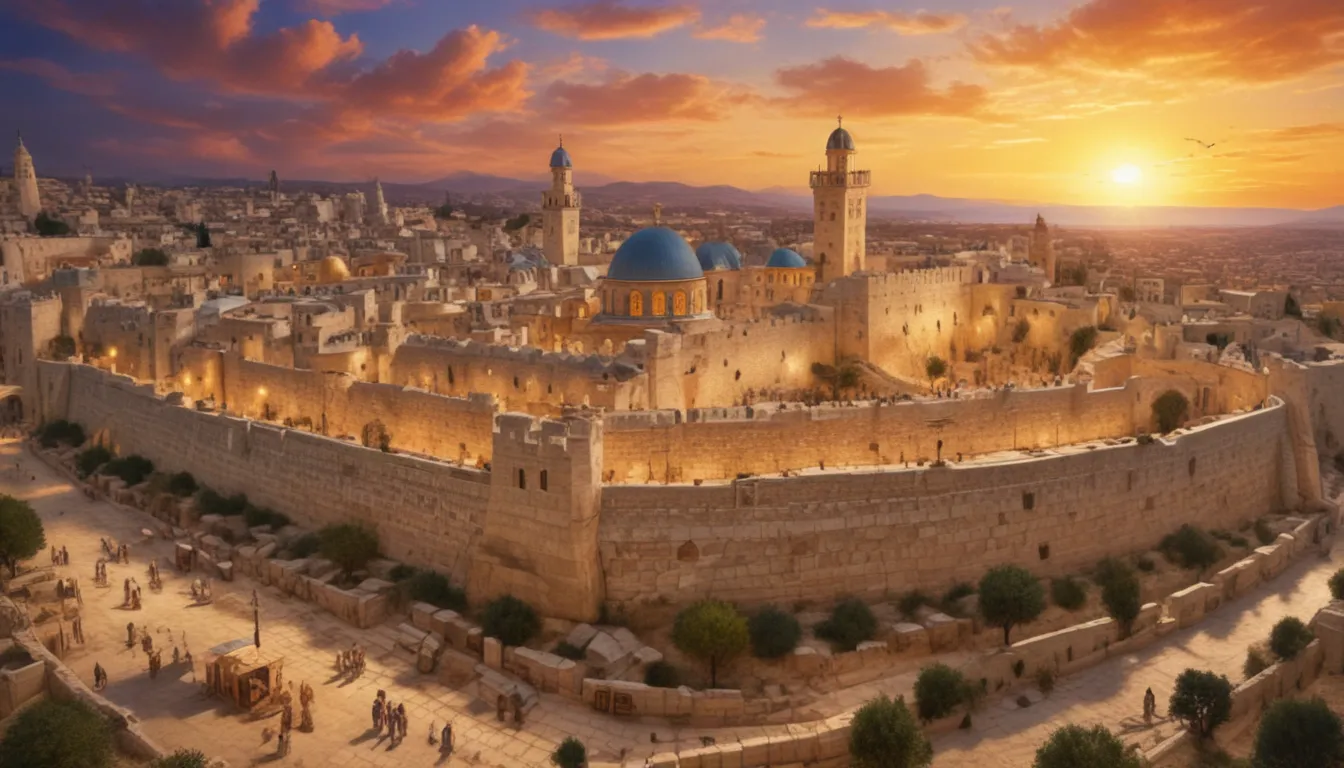
Jerusalem has long been considered one of the most significant places in Christianity, Judaism, and Islam. It’s mentioned over 700 times in the Holy Bible and is often referred to as the “Holy City.” But what is the spiritual meaning of Jerusalem in the Bible? Let’s dive into this fascinating topic to understand its importance in religious texts and practices.
The Etymology of Jerusalem
First, let’s start by looking at the origin of the name ‘Jerusalem.’ It comes from two Hebrew words: “Yireh” meaning “to see” or “vision,” and “Shalem,” which means “peace” or “wholeness.” Combining these words, Jerusalem can be interpreted as “the city where peace is seen” or “the place of visionary peace.”
Jerusalem in the Old Testament
Jerusalem’s significance in the Bible starts with its mention in the Old Testament. It was originally a Canaanite settlement called Salem, which later became known as Jebus (a name still used today for the old city). In Genesis 14:18-20, God appears to Abraham and tells him to walk through the land, promising that the land will be given to his descendants. This event marks the beginning of Jerusalem’s importance in biblical history.
God later chooses David as king over Israel and promises him that his kingdom will endure forever. In 2 Samuel 5:6-10, King David captures Jebus (Jerusalem) from the Jebusites, making it the capital of his kingdom. This event is considered a pivotal moment in Jerusalem’s history, as God’s promise to David ensures its importance for future generations.
Jerusalem as the Center of Worship
After King Solomon builds the First Temple in Jerusalem (circa 957 BCE), it becomes the central place of worship for the Israelites and the location where God’s presence resides. The temple is later destroyed by the Babylonians in 586 BCE, but under Persian rule, the Second Temple is built on the same site in 516 BCE.
The rebuilding of the temple signifies hope for the Israelites and a return to their spiritual roots. It also marks the beginning of Jerusalem as a center of pilgrimage for Jewish people from all over the world.
The New Testament and Jesus’ Connection to Jerusalem
In the New Testament, Jerusalem plays a vital role in the life, death, and resurrection of Jesus Christ. He frequently visits the city and teaches at the Temple. It is also where Jesus is crucified on Golgotha and later rises from the dead. The book of Acts details how the early Christian church begins to grow and spread throughout Jerusalem.
The spiritual meaning of Jerusalem in the New Testament can be seen in its role as a place of redemption, sacrifice, and resurrection. It’s where Jesus fulfills prophecy and brings salvation to humanity.
The Church’s Presence in Jerusalem
Throughout history, Jerusalem has been a focal point for Christian pilgrimages, with many important sites connected to Jesus’ life and ministry. These include the Church of the Holy Sepulchre (built over the traditional sites of the crucifixion and resurrection), the Garden Tomb, and the Via Dolorosa, which is believed to be the path Jesus walked on his way to crucifixion.
The spiritual meaning of Jerusalem in Christianity is deeply connected to these sacred locations. They serve as tangible reminders of the events that took place during Jesus’ life and offer Christians a chance to connect with their faith through pilgrimage.
The Future of Jerusalem in Religious Texts
In both Judaism and Christianity, there are prophecies regarding the future of Jerusalem. Some believe that it will become the center of the world when the Messiah comes. Others think that it will be destroyed before the end times or rebuilt as a spiritual city where all nations come to worship God.
No matter one’s interpretation, the spiritual meaning of Jerusalem in the Bible remains an essential aspect of religious beliefs and practices for millions of people around the world. Its rich history and connection to the lives of Abraham, David, Jesus, and other significant figures make it a truly sacred place.
Conclusion: The Enduring Significance of Jerusalem
The spiritual meaning of Jerusalem in the Bible cannot be understated. From its origins as a Canaanite settlement to its role as the center of worship for Jews and Christians alike, this city has played an essential part in religious history. Its significance continues today, with millions making pilgrimages to its holy sites each year.
As we reflect on the importance of Jerusalem in both Judaism and Christianity, let us remember that it is a place where peace is seen and hope is found. May we all strive to embrace this vision of peace and wholeness as we seek to live our lives according to God’s promises.





